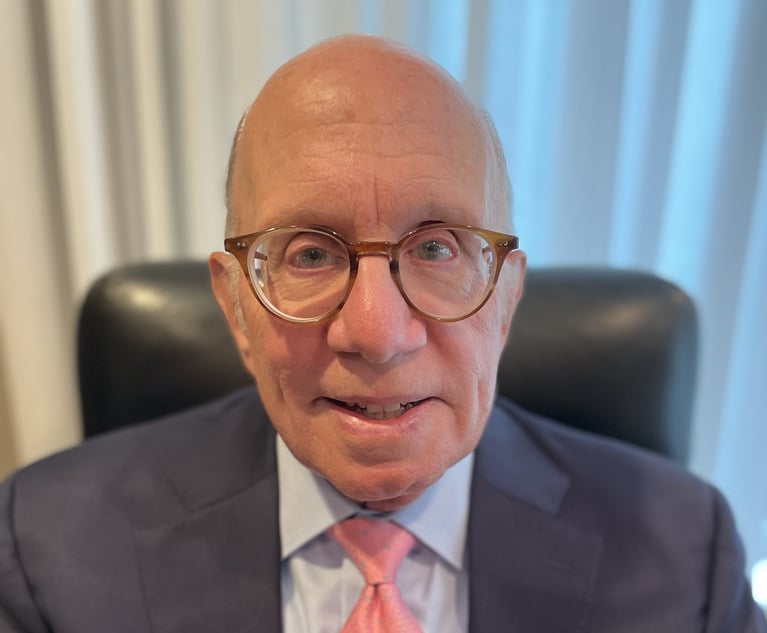 Joel Cohen
Joel Cohen'The Law's Delay'—In Pandemic Times
If a defendant genuinely wants a speedy trial today, and his lawyer is ready and prepared to be his trial gladiator, he won't be able to get that trial—through literally nobody's fault.
April 30, 2020 at 10:00 AM
5 minute read
In his soliloquy, one of the more important speeches in English language, Hamlet examined the moral legitimacy of suicide in an unbearably painful world. In itemizing the causes of such suicide-inducing pain, he ticked off the oppressor's wrong, the proud man's contumely, the pangs of despis'd love, the insolence of office and—"the law's delay." Yes, the law's delay. Can that delay be so excruciatingly painful to a man's existence that Hamlet, not really a victim of such delay, might actually consider committing suicide over it?
And here we are, as lawyers representing clients and interests locked down in the legal process. Not for want of trying. Sometimes trying desperately, but we simply cannot proceed forward in the manner to which we've come accustomed. We are simply "delayed," and it's clearly not the fault of the King of Denmark.
Rather, it's caused by that mantra of force majeure—an act of God—or perhaps an act of nature for those who don't believe, or don't want to lay the blame at God's feet. Put more simply, we are where we are. And however hard the powers that be, call them "the courts," try, the criminal justice system is in many ways grinding ever so slowly close to a halt—unquestionably for the beneficial goal of bringing us all safely to shore. That is, except for the tsunami of defendants' compassionate release motions for furloughs or home confinement given that prisons have become petri dishes for the killer virus.
Of course, the Right to a Speedy Trial was canonized by the Founders in the Sixth Amendment, and could, in better times, be relied on by most defendants (at least in the federal courts). The dirty legal secret among those in the know, however, is that the defense typically didn't really want a speedy trial—their lawyers were overburdened and weren't themselves ready so quickly and have wangled delay—except when prosecutor took advantage and abused the process by heaping superseding indictments upon them. Accordingly, a federal defendant's interest in a speedy trial has largely been a technical effort to hold the prosecutor's feet to the fire when the prosecution wasn't really ready for trial. (Not so, by the way, in state courts).
But that speedy trial dance is no longer here, even if constitutionally mandated. If a defendant genuinely wants a speedy trial today, and his lawyer is ready and prepared to be his trial gladiator, he won't be able to get that trial—through literally nobody's fault.
And consider the crime victim—they suffered a violent crime, an economic fraud perhaps. They just want justice, and a speedy justice at that. But it's nowhere to be found. And not because of an overburdened system or lazy judges. Rather, it's that law enforcement can't interview them in any meaningful way; subpoenas can't be served properly; and—perhaps most compelling—grand juries needed to indict the perpetrators can't even meet.
In the criminal arena, it's typically the federal prosecution that is harmed by delay. The prosecutor having been prepared for the case during the grand jury presentation is "ready" and usually wants justice for society, and for the crime victim. She knows that criminal cases aren't like fine wine—they don't get better with age. Witnesses move, they forget; maybe they shuffle off their mortal coils.
But nowadays, the languishing defendant, in federal, state or local court is clearly the victim, particularly if he is in jail, pre-trial. He can't get to trial—the courtroom doors are shuttered—and he is, to boot, at risk of serious illness or even death itself given the proximity of likely carriers. Hardly the intent of the system or the judge who remanded him at his arraignment. No one really knew several months ago, except perhaps skilled epidemiologists, that this was coming or how it might infect us.
We are a people that likes to lay blame on someone—anyone! Still, there is no blameworthy person or figure here. And the answer certainly isn't Hamlet's—"to take arms against a sea of troubles, and by opposing end them? To die." The criminal justice system is in turmoil. It has largely served us well. Our job, the job of those of us who work within the system and have benefitted from it, is to find workable, practical and equitable solutions to these problems that may, sadly, endure for a significant while to come. The jail population, quite unlike the nursing home population, isn't a particularly sympathetic group. Nonetheless, prisoners deserve a "second bite"—an instant replay, as it were, of their sentences or the bail hearings when they were remanded, particularly if they occurred before the pandemic. It would give the judge an opportunity to redo what she did back then, now fully aware of the true consequences of what she was doing.
Most judges, undoubtedly, would have taken the pandemic into consideration when making those pivotal and individualized decisions had they known it was coming. The law and its practice needs to give judges the urgent power to reconsider those decisions given what has happened over time.
Maybe Justice Frankfurter said it best: "No court can make time stand still." Almost as good as Shakespeare, no?
Joel Cohen, a former prosecutor, practices white-collar criminal defense law as senior counsel at Stroock & Stroock & Lavan. He is the author of "Blindfolds Off: How Judges Decide" (ABA Publishing, 2004), and is an adjunct professor at both Fordham, and Cardozo Law Schools where he teaches a course on judging based on the book.
This content has been archived. It is available through our partners, LexisNexis® and Bloomberg Law.
To view this content, please continue to their sites.
Not a Lexis Subscriber?
Subscribe Now
Not a Bloomberg Law Subscriber?
Subscribe Now
NOT FOR REPRINT
© 2024 ALM Global, LLC, All Rights Reserved. Request academic re-use from www.copyright.com. All other uses, submit a request to [email protected]. For more information visit Asset & Logo Licensing.
You Might Like
View All
Why Is It Becoming More Difficult for Businesses to Mandate Arbitration of Employment Disputes?
6 minute read
Law Firms Mentioned
Trending Stories
- 1Gibson Dunn Sued By Crypto Client After Lateral Hire Causes Conflict of Interest
- 2Trump's Solicitor General Expected to 'Flip' Prelogar's Positions at Supreme Court
- 3Pharmacy Lawyers See Promise in NY Regulator's Curbs on PBM Industry
- 4Outgoing USPTO Director Kathi Vidal: ‘We All Want the Country to Be in a Better Place’
- 5Supreme Court Will Review Constitutionality Of FCC's Universal Service Fund
Who Got The Work
Michael G. Bongiorno, Andrew Scott Dulberg and Elizabeth E. Driscoll from Wilmer Cutler Pickering Hale and Dorr have stepped in to represent Symbotic Inc., an A.I.-enabled technology platform that focuses on increasing supply chain efficiency, and other defendants in a pending shareholder derivative lawsuit. The case, filed Oct. 2 in Massachusetts District Court by the Brown Law Firm on behalf of Stephen Austen, accuses certain officers and directors of misleading investors in regard to Symbotic's potential for margin growth by failing to disclose that the company was not equipped to timely deploy its systems or manage expenses through project delays. The case, assigned to U.S. District Judge Nathaniel M. Gorton, is 1:24-cv-12522, Austen v. Cohen et al.
Who Got The Work
Edmund Polubinski and Marie Killmond of Davis Polk & Wardwell have entered appearances for data platform software development company MongoDB and other defendants in a pending shareholder derivative lawsuit. The action, filed Oct. 7 in New York Southern District Court by the Brown Law Firm, accuses the company's directors and/or officers of falsely expressing confidence in the company’s restructuring of its sales incentive plan and downplaying the severity of decreases in its upfront commitments. The case is 1:24-cv-07594, Roy v. Ittycheria et al.
Who Got The Work
Amy O. Bruchs and Kurt F. Ellison of Michael Best & Friedrich have entered appearances for Epic Systems Corp. in a pending employment discrimination lawsuit. The suit was filed Sept. 7 in Wisconsin Western District Court by Levine Eisberner LLC and Siri & Glimstad on behalf of a project manager who claims that he was wrongfully terminated after applying for a religious exemption to the defendant's COVID-19 vaccine mandate. The case, assigned to U.S. Magistrate Judge Anita Marie Boor, is 3:24-cv-00630, Secker, Nathan v. Epic Systems Corporation.
Who Got The Work
David X. Sullivan, Thomas J. Finn and Gregory A. Hall from McCarter & English have entered appearances for Sunrun Installation Services in a pending civil rights lawsuit. The complaint was filed Sept. 4 in Connecticut District Court by attorney Robert M. Berke on behalf of former employee George Edward Steins, who was arrested and charged with employing an unregistered home improvement salesperson. The complaint alleges that had Sunrun informed the Connecticut Department of Consumer Protection that the plaintiff's employment had ended in 2017 and that he no longer held Sunrun's home improvement contractor license, he would not have been hit with charges, which were dismissed in May 2024. The case, assigned to U.S. District Judge Jeffrey A. Meyer, is 3:24-cv-01423, Steins v. Sunrun, Inc. et al.
Who Got The Work
Greenberg Traurig shareholder Joshua L. Raskin has entered an appearance for boohoo.com UK Ltd. in a pending patent infringement lawsuit. The suit, filed Sept. 3 in Texas Eastern District Court by Rozier Hardt McDonough on behalf of Alto Dynamics, asserts five patents related to an online shopping platform. The case, assigned to U.S. District Judge Rodney Gilstrap, is 2:24-cv-00719, Alto Dynamics, LLC v. boohoo.com UK Limited.
Featured Firms
Law Offices of Gary Martin Hays & Associates, P.C.
(470) 294-1674
Law Offices of Mark E. Salomone
(857) 444-6468
Smith & Hassler
(713) 739-1250








